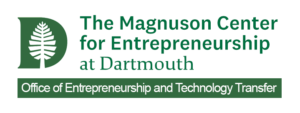Andrew Housser On Creating Resiliency By Chasing A Worthwhile Cause
The founder and CEO of the financial services company Achieve bootstrapped the company and scaled it to more than 3,000 employees. He spoke at the Dartmouth Entrepreneurs Forum about what he’s learned over 20 years of entrepreneurship.

Looking back on more than two decades of entrepreneurship, Andrew Housser ’95, Founder and CEO of Achieve, sees a rollercoaster of experiences.
“Sometimes things are great, sometimes things are crazy and chaotic, and sometimes you literally think the world is ending,” Housser said during a Fireside Chat to kick off the Dartmouth Entrepreneurs Forum held at the Hanover Inn earlier this month.
Housser, a member of the Magnuson Center’s Board of Advisors, was speaking with Andrea Johnson ’91, co-founder and CEO of Rally Reader and another member of the board. He reflected on his experience building a financial services company that now has more than 3,000 employees. Being an entrepreneur working in a business he’s passionate has given his life meaning.
“There have been times I’ve been stressed or scared, there have been highs and lows, but there has never been a time I’ve wondered what I’m doing with my life,” he said.
From Wall Street to the other side of the table
After graduating Dartmouth with an engineering degree, Housser took a job as an investment banker on Wall Street.
"It was intellectually stimulating, but it wasn’t emotionally stimulating,” Housser said. Some days, he boarded the New York subway in his suit, wondering what he was doing. Later, Housser became a private equity investor. But each time he met with entrepreneurs, he realized he would much rather be sitting on their side of the table.
“That seemed much more interesting,” he said. “But I had no idea how I would get on the other side of the table.”
Business school would give him an opportunity to pause, he said, and make that transition into entrepreneurship. He enrolled at Stanford, just as the dot-com bubble popped, throwing Silicon Valley into turmoil.
The heart and the dollar
Housser and his co-founder Brad Stroh were interested in creating a solution to consumer debt. But they did not want to contribute to the cycle of poverty or leave their clients on worse financial footing.
“We’ve got to feel good about what we’re doing,” Housser said.
Today, the idea of the double bottom line—which joins financial profit and social responsibility—is gaining traction. But 20 years ago no one was talking about that, Housser said. Yet he and Stroh knew they wanted to be guided by the heart and the dollar.
“That heart and dollar bottom line was the founding pillar,” he said.
After six months of brainstorming and researching an approach to financial services that was both profitable and ethical, Housser and Stroh were empty handed. Then, a friend confided in Housser that he had negotiated $30,000 in consumer debt to $9,000. It was a lightbulb moment for Housser.
He and Stroh entered what Housser called “the most romantic phase” of entrepreneurship—planning. Fueled by high-fives and Starbucks, they launched a website to see if consumers were interested in paying someone to negotiate their debt. The site went live on Sunday, and Monday morning Housser woke up to more than 100 requests from customers.
“In our mind, we thought we were doing research at this point,” he said. “But they didn’t want to be part of a research project, they wanted us to help them with their problem… The next thing you know we’re in business.”
Bootstrapping a startup
Founding a company during the dot-com bust, Housser knew it would be difficult to secure venture capital funding. But that’s not the only reason he steered clear of VCs.
“We didn’t want the strings that were attached to that,” he said.
Housser compared VC funding to student loans—necessary in some circumstances, but best avoided if possible. He and Stroh wanted to be able to stay true to their vision: running a company long-term rather than having a forced exit, and making sure that providing value to customers continued to be a core value.
The duo raised $30,000 in initial funding, and about $300,000 from friends and family. That was the only capital they raised during the first ten years of the business, during which they scaled to having 500 employees.
While bootstrapping allowed them to retain control, the downside was that they were “doing everything,” Housser said, from sales and customer service to balancing the books.
Coping with government regulation
The debt consolidation industry had few barriers to entry and great potential. And so, it attracted many competitors, many of which didn’t have the customers’ needs and financial wellness at heart, Housser said.
During the George W. Bush presidency, the industry started to attract the attention of federal lawmakers. They proposed a change that meant companies like Achieve—then called Freedom Debt Relief—couldn’t be paid upfront: they needed to deliver on their promises first.
That shifted the entire cash flow of the business, and threatened its stability. At first, Housser fought the regulation, but eventually Achieve was the only debt consolidation company to get on board with the new regulation.
“We realized this was going to be the only way to clean up this industry and put a moat around it,” Housser said. The regulations were like chemo for the industry: painful but necessary, and ultimately critical for long-term health.
However, to bridge the gap, Housser needed to raise $100 million. Paul Allen, co-founder of Microsoft, came though just days before Achieve would have been unable to make payroll.
Failure, passion and resilience
These days, many people are told not to let fear of failure impact them. But that message is hypocritical, Housser said, when delivered by a society that values success. He had slightly different advice for students and young alums:
"Pursue something that’s worthwhile,” he said. “If you pursue something worthwhile that is important to you, you’re going to be resilient in the face of failure.”
Remember that one failure doesn’t mean failure overall. Housser recently backed a friend who had failed in one entrepreneurial venture, but was trying another with the benefit of everything he learned from the first. If all else fails, entrepreneurs are always desirable employees, Housser said, because they think outside the box, understand the motivations of owners, and are driven to succeed.
“It’s one of the few things in life where—I don’t want to say it—you shouldn’t fear failure,” he said.

